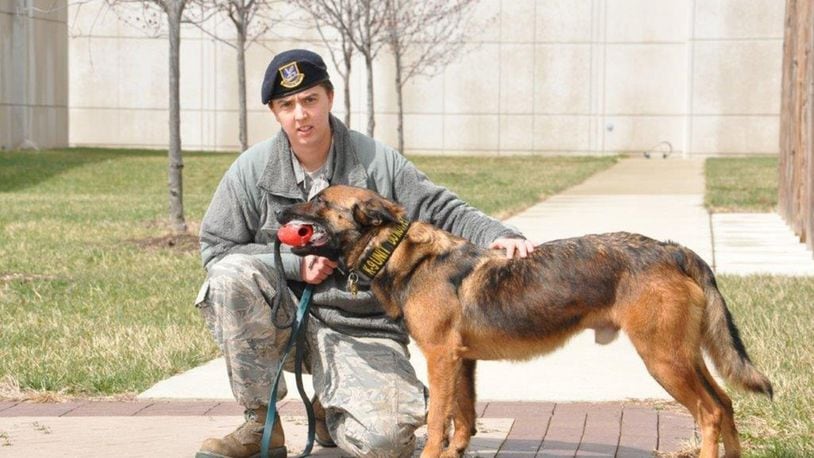According to Albright, anyone can be taught to handle a dog, from the aggressive person with an A-type personality to the introvert. Anyone can be successful in handling the dogs as long as he or she shows the interest and has the determination and willingness to succeed.
It takes a partnership between the handler and the dog for training to be successful.
“We help them regardless [of] what learning style they have,” Albright said. “We can repeat the basics, spend extra time to walk out a problem with their dog. [For the dogs] we can put down markers so they can open their eyes and not just see [through] tunnel vision when searching.”
Freeman is the newest member of the two new dog handlers. His interest in becoming a dog handler was piqued at his first duty station where he volunteered his time at the military dog kennels. At first, he was not satisfied with his job, but once he was able to re-train into the MWD career field he reconsidered.
“Going K9 is what made me [want to] stay in the military,” Freeman said.
Freeman initially went through hurdles in training to be the authoritative figure – or alpha – to his dog.
“After a while, [teaching and correcting his dog] became repetitive,” he said. “I got used to it, and it became my job.”
More importantly, new handlers need to realize they are in a critical position and when walking behind a bomb or drug dog – things can happen, Albright explained.
“Once they understand that and they are willing to continue, we can work with them,” she said.
Martinelli has always wanted to become a dog handler ever since he attended Technical School at Lackland Air Force Base, Texas, so much that he became decoy certified at his first base in order to participate in training the dogs.
The handlers are taught that the longer they train and work with their dog, the stronger the bond becomes and the dog respects them more, Martinelli said.
“I want us to bond more, so last week I stayed the night with my dog at the vet and even slept on the floor with him,” he added.
In MWD training school at Lackland AFB, handlers learn basic skills, such as:
* How to handle a leash and work a dog
* Teach a dog how to detect drugs or explosives;
* How to recognize change of behavior in the dogs;
* Teaching a dog basic obedience;
* Teaching a dog how to do bite work to apprehend an individual
The new handlers will soon learn additional skills, such as communicating with senior leaders of all military branches to support Secret Service missions and deployments.
“We teach them how to speak to military leaders, how to fix problems [with their dog], how to be safe, and come home alive,” said Albright.
Handlers are paired to work and train with the same dog throughout their tour of duty unless there is a specific need to swap them. Reasons to swap can range from medical issues with the dog, trainer and dog not meshing together, or the dog stops finding its target odor and falls behind the required 90 to 95 percent accuracy rate. In the latter case, the dog is considered unsuitable for MWD work and the handler is assigned a new partner.
Becoming an MWD handler is considered a lateral re-train within the career field. Members are still part of Security Forces.
“[The difference is] we are a cop with a dog,” said Freeman.
Handlers have the option to later become instructors at the 341st Training Squadron, kennel masters or trainers at Dog Training School where they train dogs from the time the dogs are procured.
Other aspects that entail becoming a military dog handler include many hours spent with training, off-duty time requirements, cleaning of kennels, Secret Service missions, deployments and short notice taskings.
Dale, who has been a handler and trainer with the Wright-Patterson kennels for the past seven years, is transitioning from active duty to the Air National Guard in Springfield, Ohio, to continue his career in dog handling since Security Forces sets limitations on staying a dog handler up to a certain rank. Once the rank E-6 is reached, the handler goes back to becoming a regular Security Forces member, a trainer or kennel master.
Dale reflected back with his time with retired MWD Blecki and the U.S. Secret Service missions.
“When I’m wearing khakis and a polo shirt, [Blecki] knows we are going on a road trip,” said Dale. “He’s been with me for a long time, and it’s great to have the same partner who is always there, a partner you can bond with.”
“The ops tempo can be challenging,” he explained. “At times, I’ve just returned home from a bomb threat search from a local school or a Secret Service mission, when I receive a short-notice tasking to leave out again really quick. Whether it’s for a short or long trip, I have to out-process [me and my dog].”
Out-processing for a mission trip includes packing luggage, making an appointment with the base veterinarian to get your dog health certified, acquiring travel orders and preparing a vehicle. The dog’s kennel, food, medication and toys have to be included also.
Although, Dale is departing Wright-Patt, two excited new handlers are set in place to continue the MWD mission.
About the Author
